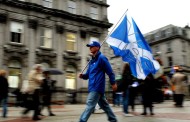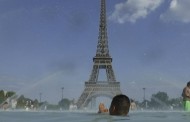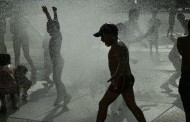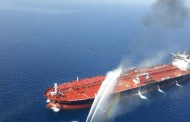(Reuters) – Turkey said on Monday it would allow Iraqi Kurdish fighters to reinforce fellow Kurds in the Syrian town of Kobani, while the United States air-dropped arms for the first time to help the defenders resist an Islamic State assault.
U.S. Secretary of State John Kerry said Washington had asked Ankara to help “get the peshmerga or other groups” into Kobani so that they could help defend the town on the Turkish frontier, adding that he hoped the Kurds would “take this fight on”.
If the reinforcements come through, this may mark a turning point in the battle for Kobani, a town that has become a frontline of the battle to foil Islamic State’s attempt to reshape the Middle East.
The Syrian Kurds have struggled for weeks against better armed Islamic State fighters. U.S.-led air strikes have helped the Kurds avoid defeat, but they been unable to resupply fighters besieged on three sides by Islamic State and blocked by Turkey from bringing fighters or weapons over the border.
Ankara views the Syrian Kurds with deep suspicion because of their ties to the PKK, a group that waged a decades-long militant campaign for Kurdish rights in Turkey and which Washington regards as a terrorist organization.
Speaking in Indonesia, Kerry acknowledged Turkish concerns about support for the Kurds, and said the air-drop of supplies provided by the Kurdish authorities in Iraq did not amount to a change of U.S. policy.
He indicated that the battle against Islamic State, a group also known by the acronym ISIL that has seized large areas of Syria and Iraq, was an overriding consideration.
“We understand fully the fundamentals of (Ankara’s) opposition and ours to any kind of terrorist group, and particularly, obviously, the challenges they face with respect to the PKK,” he told reporters.
But he added: “We cannot take our eye off the prize here. It would be irresponsible of us, as well as morally very difficult, to turn your back on a community fighting ISIL.”
Iraqi Kurdish official Hemin Hawrami, writing on his Twitter feed, said 21 tonnes of weapons and ammunition supplied by the Iraqi Kurds had been dropped in the small hours of Monday.
Kerry said both he and President Barack Obama had spoken to Turkish authorities before the air-drops “to make it very, very clear this is not a shift of policy by the United States”.
“It is a crisis moment, an emergency where we clearly do not want to see Kobani become a horrible example of the unwillingness of people to be able to help those who are fighting ISIL,” he added.
Turkey has stationed tanks on hills overlooking Kobani but has refused to help the Kurdish militias on the ground, suspicious of their links to the PKK (Kurdistan Workers’ Party) and demanding broader U.S. action that would target Syrian President Bashar al-Assad as well as Islamic State.
Turkish Foreign Minister Mevlut Cavusoglu said Ankara was facilitating the passage of Iraqi Kurdish peshmerga forces which are also fighting Islamic State in Iraq.
Cavusoglu stopped short of saying whether Ankara backed the U.S. decision to air-drop the weapons.
PESHMERGA PREPARATIONS
The spokesman for the Kurdistan Regional Government’s (KRG) peshmerga fighters said that the Iraqi Kurdish region was ready to send backup forces to Kobani and planning was underway. “There are efforts and we are prepared to send some back-up forces either by land or air,” said KRG peshmerga ministry spokesman Jabar Yawar. He said the forces were not en route.
But one Kurdish official in Iraq, speaking on condition of anonymity, expressed doubt that any fighters would be deployed to Kobani as they battle Islamic State at home.
The Kurdish administration in Syria has said thousands of fighters are ready to cross to Kobani from other Kurdish areas of northeastern Syria if Turkey allows them to.
Turkey’s refusal to intervene in the fight with Islamic State has led to frustration in the United States. It has also provoked lethal riots in southeastern Turkey by Kurds furious at Ankara’s failure to help Kobani or at least open a land corridor for volunteer fighters and reinforcements to go there.
“NOT ENOUGH TO DECIDE THE BATTLE”
The U.S. Central Command said U.S. Air Force C-130 aircraft had dropped weapons, ammunition and medical supplies to allow the Kurdish fighters to keep up their resistance in the town which is called Kobani in Kurdish and Ayn al-Arab in Arabic.
The main Syrian Kurdish armed group, the YPG, said it had received “a large quantity” of ammunition and weapons.
Redur Xelil, a YPG spokesman, said the arms dropped would have a “positive impact” on the battle and the morale of fighters. But he added: “Certainly it will not be enough to decide the battle.”
“We do not think the battle of Kobani will end that quickly. The forces of (Islamic State) are still heavily present and determined to occupy Kobani. In addition, there is resolve (from the YPG) to repel this attack,” he told Reuters in an interview conducted via Skype.
He declined to give details on the shipment.
Welat Omer, one of five doctors in Kobani, told Reuters by telephone that he and his colleagues had received medicine and were distributing it to patients. This included drugs for children and the elderly and materials for operations.
“This medicine will only be enough for five days. We want them to send more, because we have many patients,” he said.
Kurds in Turkey expressed support for the airdrop. “We are so happy the U.S. is doing this but we want Turkey to open the corridor because the people there are our relatives and we don’t think this help is enough. We are waiting for more help from the U.S.,” said Halil Altay, 47, speaking in the Turkish town of Suruc, about 10 km (6 miles) from Kobani.
The United States began carrying out air strikes against Islamic State targets in Iraq in August and about a month later started bombing the militant group in neighboring Syria.
However, the resupply of Kurdish fighters marks an escalation in the U.S. effort to help local forces beat back the radical Sunni militant group in Syria. It points to the growing coordination between the U.S. military and a Syrian Kurdish group that had been kept at arms’ length by the West due partly to the concerns of NATO member Turkey.
The United States is also planning to expand military aid to the “moderate” opposition to Assad as part of its strategy against Islamic State. But rebel groups battling both Assad and Islamic State in western Syria complain they have yet to receive the kind of support going to the Kurds, whom they have accused of cooperating with Assad – a charge the Kurds deny.
Washington has pressed Ankara to let it use bases in Turkey to stage air strikes, and a Turkish foreign ministry official said the country’s airspace had not been used during the drops on Kobani.
The U.S. military conducted six air strikes against Islamic State militants near Kobani on Sunday and Monday, the U.S. Central Command said in a statement.
U.S. forces, in coordination with Iraqi ground troops, also conducted six air strikes against the militant group in Iraq near Fallujah and Bayji with help from France and Britain, Central Command said.
ADVANCE NOTICE
Obama gave advance notice to his Turkish counterpart Tayyip Erdogan of the plans to deliver arms to the Syrian Kurds.
The Turkish presidency said Obama and Erdogan had discussed Syria, including measures that could be taken to stop Islamic State’s advances, and Kobani.
In a statement published on Sunday, it also said Turkish assistance to over 1.5 million Syrians, including around 180,000 from Kobani, was noted in the conversation.
In comments published by Turkish media on Monday, Erdogan equated the main Syrian Kurdish political group, the PYD, with the PKK, describing both as terrorist organizations.
“It will be very wrong for America with whom we are allied and who we are together with in NATO to expect us to say ‘yes’ (to supporting the PYD) after openly announcing such support for a terrorist organization,” Erdogan said.
Kobani is one of three areas near the border with Turkey where Syrian Kurds have established their own government since the country descended into civil war in 2011.
(Reporting by Mohammad Zargham, Arshad Mohammed, Warren Strobel in Washington, Tom Perry in Beirut, Seda Sezer in Turkey, David Brunnstrom in Indonesia and Dasha Afanasieva in Suruc, Turkey, Seyhmus Cakan in Diyarbakir, Isabel Coles and Ned Parker in Iraq; Writing by Tom Perry; Editing by Sophie Walker and David Stamp)


 ο ψηφοφόρος της κλανιόλας
ο ψηφοφόρος της κλανιόλας η εποχή ζητά ενσυναίσθηση, συνείδηση και συμμετοχή, πολιτική ανασκόπηση
η εποχή ζητά ενσυναίσθηση, συνείδηση και συμμετοχή, πολιτική ανασκόπηση γεωπολιτική για καμένους εγκεφάλους
γεωπολιτική για καμένους εγκεφάλους













